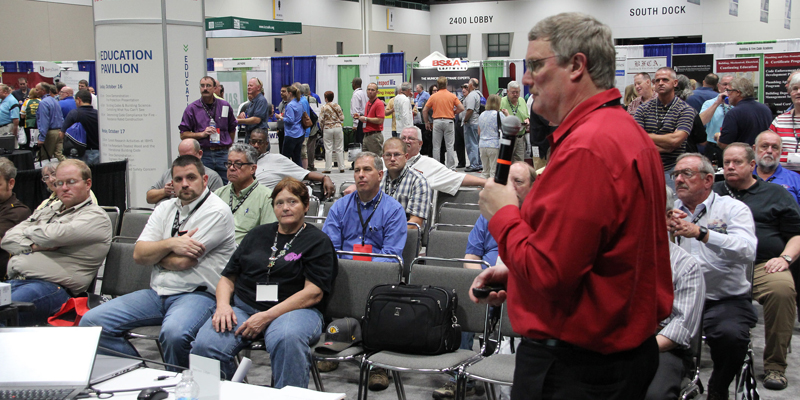- Using Virtual Reality for Site Safety | This session will give an overview of how virtual reality is being integrated into architecture, engineering and construction to facilitate project communication and create safer spaces. We will discuss the state of virtual reality as an industry, show how to create a navigable, fully
immersive, virtual reality environment from a three-dimensional model and discuss ways that code officials, inspectors and contractors can use virtual walkthroughs to facilitate both worksite and structural safety.
- New Requirements for Protecting Pallet Storage | The 2018 International Fire Code contains two new sections that address the storage of pallets. One section addresses the storage of idle pallets and the second addresses the storage of pallets at manufacturing and recycling facilities. This session will identify when each section is to be used and the general basis for the requirements in each section.
- Introduction to Mass Timber in Tall Wood Structures | Cross-laminated timber has been in use worldwide for more than 15 years, but most notably in Europe. Building with cross-laminated timber has increased in popularity for many reasons including: just-in-time fabrication and jobsite delivery, speed and efficiency in construction, reduced jobsite noise and on-site labor force, substitution of high embodied materials with a renewable resource that sequesters carbon, and creating a living or work space that has the aesthetics of exposed wood.
- Floodplain Design, Construction and Impacts on Flood Insurance | Session will describe floods, floodplains and the potential hazards to buildings; explain the differences between wet flood proofing and dry flood proofing techniques and acceptable applications; describe the role flood openings play in creating resilient structures in the FEMA flood zone; and review point of use stored dry floodproofing barriers and their effectiveness. This course also clarifies the ASCE 24 design standards, codes and regulations as they relate to sustaining foundations in flood hazard areas. Additionally, it analyzes the role of building compliance in lowering flood insurance rates and what mitigation solutions are available to existing structures.
- Fire-Retardant-Treated Wood and the International Building Code | This session is a discussion of fire-retardant-treated wood technical characteristics and building code related applications. Emphasis is placed on the testing and labeling required by the International Building Code. The building code, as with many products, regulates the use of wood in construction. Two broad categories separate materials: combustible and noncombustible. Codes limit the applications of combustible materials on the basis of fire and life safety. The question is then, are there options available to using wood in lieu of non-combustible materials? This session will help answer that question.
- Code Change Proposal Submission with cdpACCESS | Come see the first demonstration of the improved cdpACCESS for the 2018 code cycle. You'll get a complete walkthrough of the code change proposal submission process, and a preview of what's to come for 2018 Group A and beyond. If you're already familiar with cdpACCESS, this will be a great refresher; if you're new to the system, we'll start from the ground up.
- Impact of Preservative Treated Wood changes on the Building Codes | This course takes a detailed look at the major changes that recently occurred within the American Wood Preservation Association, which is a reference standard to both the International Building Code and the International Residential Code, and the impact these changes have with respect to the building codes and construction. Educates plan reviewers, code enforcement and inspection officials, along with architects, engineers and contractors of critical changes to preservative treated wood products to help ensure treated wood structures are safely built and maintained.
- Aerial Technology to Disrupt and Alter Building and Construction | Learn from aerial technology (drone) experts on how aerial data gathering, processing and collaboration is disrupting building and construction. Learn how this technology integrates to current GIS, BIM, CAD technologies to maximize capabilities over the lifecycle of projects, and how to fund and determine value deploying the technology. Know when and where you should deploy this technology, and on what kind of jobs.
- Building Envelope/Curtain Wall Requirements in the IBC | This presentation covers a basic introduction of the International Building Code Chapter 14 (Exterior Walls) requirements for weather protection of the exterior building envelope. The attendees will gain an understanding of key International Building Code requirements and the related performance testing standards and methods available for ensuring code compliance of curtain walls, windows, doors and storefronts.
- How to Start a High School Technical Training Program at Your Local Technical High School or College | See, hear and understand how easily a code official or business can start and mentor the next generation workforce. The presentation will provide participants an avenue to initiate a community outreach program that will benefit their trade or business and establish a relationship with the youth in their community. The ICC's High School Technical Training Program has awakened school counselors and instructors to the careers associated with code knowledge. You can make a difference in your community.
- Mission Impossible: Remote Building Inspection | With the pending retirement of half the building inspectors within the next 10 years, solutions are needed that allow code officials to accomplish their work more efficiently. This session presents the findings of research that explored live-streaming remote building inspections. The findings show that code officials can accomplish more inspections per day while training new code officials.
- Trends, Analysis & Studies of Building Code Enforcement Efforts across the Nation | Attendees will gain a better understanding of national trends in building code enforcement, department financing, staffing, workload, and be able to compare their own departments to the national trends to discover how they are progressing compared to their peers.
|






